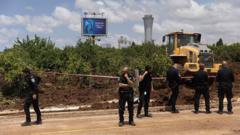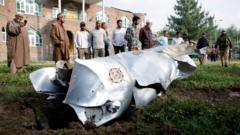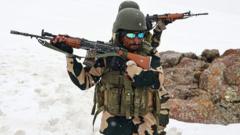Israeli Defense Forces launched a series of attacks on Houthi sites in Yemen, claiming retaliation for a missile that targeted Ben Gurion airport, leading to increased tensions in the region.
Israel Strikes Back at Houthi Targets Following Airport Missile Attack

Israel Strikes Back at Houthi Targets Following Airport Missile Attack
Israel retaliates against Houthi missile threat with targeted strikes in Yemen.
Israel's military reported on Monday that it executed strikes against positions held by the Houthi movement in Yemen, a response to a missile attack that had targeted Ben Gurion airport just a day earlier. The Israeli Defense Forces (IDF) stated their operations focused on what it characterized as key supply points for the Houthis, specifically targeting locations at Hudaydah Port and the Bajil cement factory, both integral to the group's infrastructure.
The missile attack on Sunday prompted the Houthis to announce intentions of enforcing a "comprehensive aerial blockade" on Israel, threatening further strikes on airports in light of Israel's ongoing military operations in Gaza. In the wake of the Israeli strikes, Houthi officials reported that at least 21 individuals were injured. They described the incident as a coordinated act of "US-Israeli aggression," although the US denied any involvement.
According to the IDF, their operations were conducted with precision to avoid collateral damage to civilian vessels at the port. The Bajil factory was identified as a significant economic asset for the Houthis, purportedly used for constructing tunnels and other military infrastructure, with the port serving as a crucial point for Iranian weapon transfers.
Residents in the area reported multiple explosions across Hudaydah and noted that several of the strikes specifically targeted the cement factory. Houthi health ministry spokesperson Anees al-Asbahi confirmed the injuries sustained during the attacks.
In response to the prior missile launch at Ben Gurion airport, Israeli Prime Minister Benjamin Netanyahu stated that the attack would not go unanswered, emphasizing a history of retaliatory actions against such threats. The missile, which landed near the airport's access road, injured several individuals, notably during the ensuing panic to reach safety.
Iran has claimed that the missile attack was an autonomous decision made by the Houthis, distancing itself from direct involvement. The United States has also engaged in military operations against Houthi positions in Yemen, actions that began under the previous administration and have continued into the current administration.
The ongoing conflict highlights the complicated geopolitical dynamics involving Israel, Iran, and the Houthi group, leading to escalating violence and humanitarian concerns in the Yemen region.
The missile attack on Sunday prompted the Houthis to announce intentions of enforcing a "comprehensive aerial blockade" on Israel, threatening further strikes on airports in light of Israel's ongoing military operations in Gaza. In the wake of the Israeli strikes, Houthi officials reported that at least 21 individuals were injured. They described the incident as a coordinated act of "US-Israeli aggression," although the US denied any involvement.
According to the IDF, their operations were conducted with precision to avoid collateral damage to civilian vessels at the port. The Bajil factory was identified as a significant economic asset for the Houthis, purportedly used for constructing tunnels and other military infrastructure, with the port serving as a crucial point for Iranian weapon transfers.
Residents in the area reported multiple explosions across Hudaydah and noted that several of the strikes specifically targeted the cement factory. Houthi health ministry spokesperson Anees al-Asbahi confirmed the injuries sustained during the attacks.
In response to the prior missile launch at Ben Gurion airport, Israeli Prime Minister Benjamin Netanyahu stated that the attack would not go unanswered, emphasizing a history of retaliatory actions against such threats. The missile, which landed near the airport's access road, injured several individuals, notably during the ensuing panic to reach safety.
Iran has claimed that the missile attack was an autonomous decision made by the Houthis, distancing itself from direct involvement. The United States has also engaged in military operations against Houthi positions in Yemen, actions that began under the previous administration and have continued into the current administration.
The ongoing conflict highlights the complicated geopolitical dynamics involving Israel, Iran, and the Houthi group, leading to escalating violence and humanitarian concerns in the Yemen region.






















